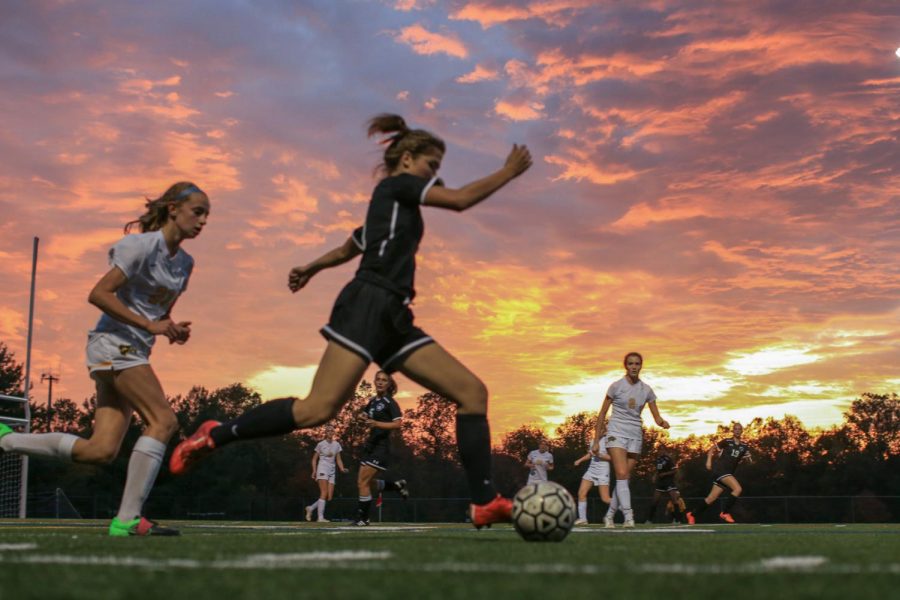The trouble with early recruitment
After several high school juniors were committing to play division one sports, University of Pennsylvania’s women’s lacrosse coach, Karin Brower Corbett, said, “It’ll never go down to sophomores.” But she was wrong. She then commented, “Soon sophomore commits turned into freshman commits. Freshman commits turned into eighth-grade commits. Some colleges are even evaluating seventh-graders. With lacrosse, softball, volleyball, soccer, basketball and more, early recruiting has become more than a trend; it is a tradition.” Early recruiting pressures young athletes to make major life decisions. The recruiting timeline moving up to eighth graders has caused the intensity of youth sports to increase, and it leaves players who develop later in life behind with no opportunities left for them.
All colleges feel the urge to “hop on board” with the early recruitment process, or they risk losing the best youth players to bring into their program. With recruitment comes cost to be on the best team, with the best coaches, and highest exposure to college recruiters. The cost increases with travel fees to visit colleges and attend showcases. The earlier the kid starts, the more money. The financial strain enhances the stress on the family and the player to perform well and impress coaches so they receive a scholarship. The intensity of competitive, top level, sports causes athletes to break down, become doubtful, and want to quit the sport they once loved.
Corbett and Kerstin Kimel, Dukes women’s lacrosse coach said, “I think the idea that we’re asking 14-year-olds or 15-year-olds to make a lifetime decision, when they’re looking at it through the lens of a 14- or 15-year-old, is not necessarily healthy or ultimately going to yield a great decision on either part. Ultimately, we worry about kids not making the right decision, and coaches not making the right decision.” Twenty-five years ago, recruiting was not this way. Athletes did not commit to a college until fall of their senior year and that was still looked at as early. Nobody wants to be left behind, and when others around are committing, it causes stress and panic to do the same. When colleges are asking a 14 or 15-year-old to commit to a school, and they threaten that if they do not commit right now that their scholarship will be given to another player, the athlete feels pressured to commit, so the opportunity is not taken away. When being asked to commit at such a young age, the athlete is also expected to know what career they would like to pursue. How does any 14-year-old know what they want to do for the rest of their life? Committing later means there is more time to research universities, go on visits, and weigh the options. In addition, the athlete will be more mature when making such a big decision.
With early commitment there is only a verbal commitment, which means that the school can take away the scholarship at any time because the National Letter of Intent is not signed until senior year of high school. In many cases, an athlete will verbally commit at an age as young as 14 years old, and then will injure themselves and have their scholarship taken away, leaving them back at square one. If the athletes weren’t allowed to commit until their senior year of high school, after the letter of intent was signed, this wouldn’t be the case.
National Collegiate Athletic Association (NCAA) conducted a survey after talking to college athletes about their recruiting process. This survey stated that the younger the athlete started their recruiting process, the more negative their experience was. The recruiting process is one of the most stressful times of an athlete’s life with the constant pressure from within and others. “I have known other athletes who sat by the phone for calls that never came while teammates and competitors they thought were not as good received more and better recruiting interest.” This form of rejection causes athletes to feel doubtful and lose confidence which leads to quitting a sport. From personal experience, starting the recruiting process as a freshman was extremely stressful, and I broke down at least 3 times a week because of the stress. After a year and a half long rollercoaster of emotions, the weights were lifted off my shoulders when an offer came from Miami University; however, I still question if it was the right decision.
http://www.espn.com/espnw/sports/article/15509558/the-impact-early-recruiting-players-coaches
http://changingthegameproject.com/time-ncaa-stop-early-recruiting-insanity/












